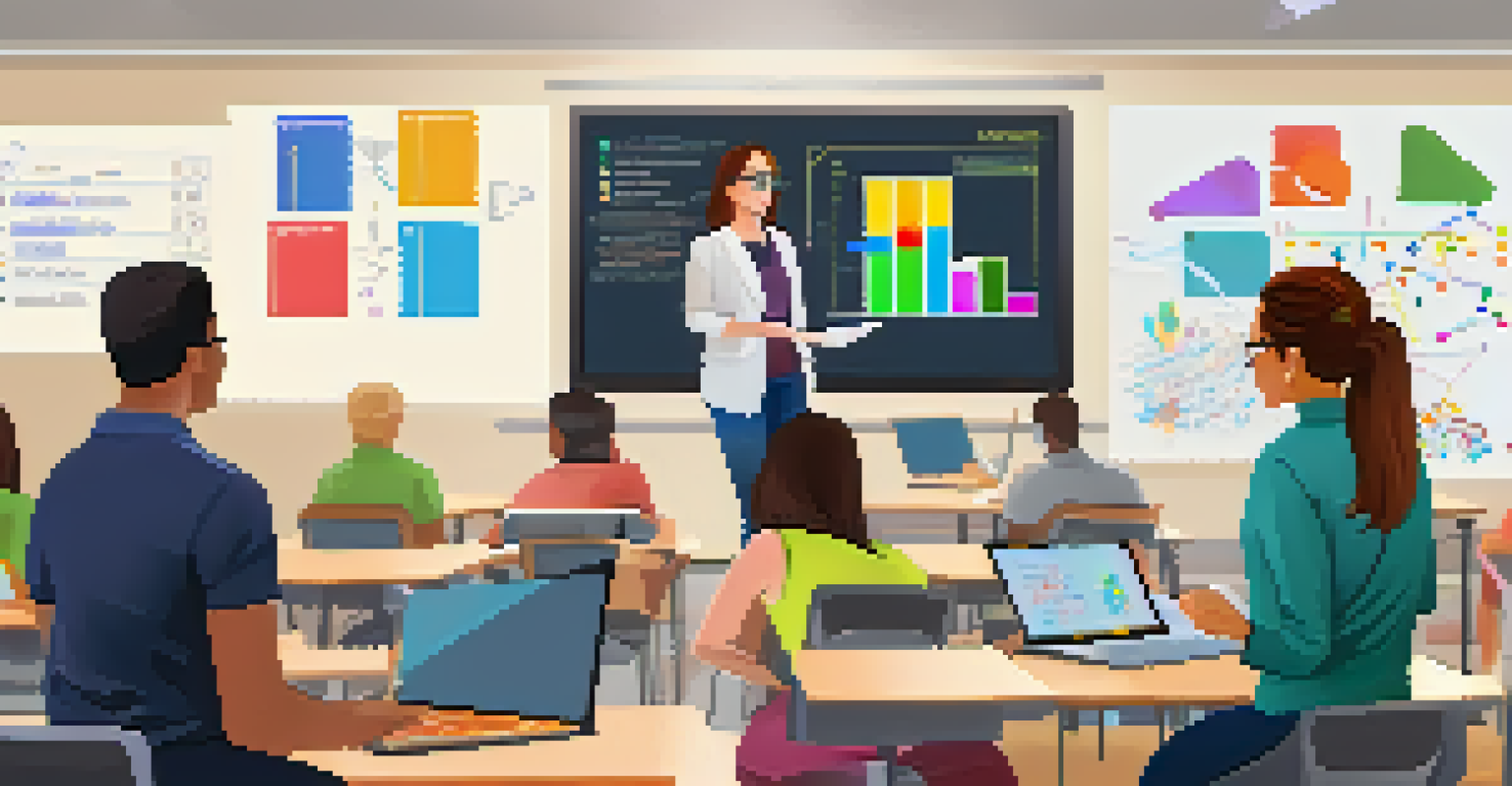How Adaptive Learning Supports Special Education Programs

Understanding Adaptive Learning in Education
Adaptive learning is an educational approach that tailors the learning experience to meet individual needs. It uses technology to assess student performance and adjust content accordingly. This personalized method is especially beneficial in special education, where learners often have unique challenges and require specialized support.
Education is not the filling of a pail, but the lighting of a fire.
By continuously analyzing how students engage with material, adaptive learning systems can modify lessons in real-time. For example, if a student struggles with a math problem, the system might offer simpler exercises or additional resources to help them master the concept. This flexibility ensures that each student can progress at their own pace, promoting confidence and competence.
Moreover, adaptive learning provides educators with valuable insights into student performance. Teachers can identify which areas a student struggles with and adjust their teaching strategies accordingly. This data-driven approach supports better planning and intervention, ultimately leading to improved learning outcomes.
Meeting Diverse Learning Needs with Adaptive Learning
Special education encompasses a wide range of learning needs, from dyslexia to autism spectrum disorders. Adaptive learning recognizes this diversity by providing customized resources that cater to various learning styles. For instance, visual learners may benefit from interactive graphics, while auditory learners might thrive through spoken instructions.

This tailored approach not only aids in comprehension but also helps in keeping students engaged. When students can relate to the material, they're more likely to participate actively in their learning journey. This engagement is crucial in special education, where maintaining interest can sometimes be a challenge.
Personalized Learning for All
Adaptive learning tailors educational experiences to meet individual student needs, promoting engagement and success.
Additionally, adaptive learning tools can offer different modes of interaction, allowing students to choose how they wish to engage with content. This autonomy fosters a sense of ownership over their education, encouraging self-directed learning and boosting motivation.
Boosting Student Confidence Through Personalization
One of the most significant advantages of adaptive learning is its ability to build student confidence. When lessons are tailored to individual abilities, students can experience success at their own level. This incremental success is vital in special education, where traditional learning environments can sometimes lead to frustration and disengagement.
The only way to do great work is to love what you do.
For example, a student who excels in reading but struggles with math can receive targeted lessons that allow them to shine in one subject while receiving support in another. This balance helps to create a more rounded educational experience and reinforces the idea that every student can succeed.
Moreover, as students see their progress tracked through adaptive learning systems, they gain a clearer understanding of their strengths and areas for growth. This awareness fosters resilience, as they learn that challenges are part of the learning process, ultimately encouraging a growth mindset.
Enhancing Teacher Support with Data Insights
Adaptive learning not only benefits students but also serves as a powerful tool for teachers. By providing detailed analytics on student performance, educators can gain insights into the effectiveness of their teaching strategies. This data allows teachers to adjust their methods, ensuring that they meet the needs of each learner effectively.
For instance, if the data indicates that multiple students are struggling with a particular concept, a teacher can revisit that topic using different techniques. This targeted approach helps maximize instructional time and improves overall learning outcomes for the class.
Empowering Teachers with Data
Detailed analytics from adaptive learning systems enable educators to refine their teaching strategies and better support diverse learners.
Furthermore, adaptive learning platforms often include resources and professional development opportunities for educators. These supports enable teachers to stay updated on best practices and innovative strategies, enhancing their ability to cater to diverse learners in special education settings.
Facilitating Collaboration Among Stakeholders
Adaptive learning encourages collaboration among various stakeholders involved in a student's education. This includes teachers, parents, and specialists who can all access the same data and insights. When everyone is on the same page, it creates a more cohesive support system for the student.
For instance, a parent can review their child's progress through an adaptive learning platform, allowing them to understand what skills are being developed and where additional support may be needed. This transparency empowers parents to engage more meaningfully in their child's education.
Additionally, specialists can use the data to tailor their interventions better. Whether it's speech therapy or behavioral support, having a comprehensive view of a student's needs enables more effective collaboration and resource allocation, ultimately benefiting the student.
Creating Inclusive Learning Environments
One of the main goals of adaptive learning in special education is to create more inclusive learning environments. By providing personalized learning experiences, students with varying abilities can learn alongside their peers. This inclusivity is essential for fostering social skills and building relationships.
Adaptive learning platforms can accommodate different learning paces and styles, ensuring that everyone feels valued in the classroom. For example, while one student may need more time on a particular subject, another could be ready to advance, allowing for a fluid classroom dynamic where collaboration thrives.
Fostering Collaboration in Education
Adaptive learning encourages collaboration among teachers, parents, and specialists, creating a cohesive support system for students.
As students work together and support one another, they develop empathy and understanding of diverse learning needs. This collaborative spirit not only enhances academic achievement but also prepares students for a more inclusive world beyond the classroom.
Looking Ahead: The Future of Adaptive Learning in Special Education
The future of adaptive learning in special education holds great promise. As technology continues to evolve, we can expect even more sophisticated tools that will refine how educators tailor their approaches. Innovations such as artificial intelligence and machine learning will likely enhance the personalization of learning experiences.
Moreover, as schools increasingly adopt these technologies, the sharing of best practices and resources will become more widespread. Educators will have access to a wealth of knowledge, leading to improved strategies that benefit all students, particularly those with special needs.

Ultimately, the integration of adaptive learning in special education is not just a trend; it's a necessary evolution. By embracing these changes, we can ensure that every learner has the opportunity to thrive and succeed in their educational journey.